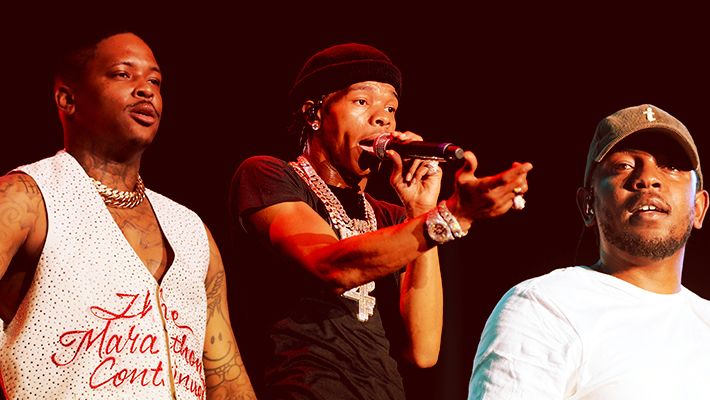We’re just a little over eight months removed from summer 2020’s Black Lives Movement protests. After the latest in an unfortunate cycle of Black lives senselessly ended by law enforcement, the protests called for an appropriate punishment for the brutal murders. Amid this latest round of protests, hip-hop artists stepped forward to use their talents to deliver contributions for the soundtrack to the movement or had older music repurposed to suit the moment.
Throughout the summer of 2020, numerous rappers offered records that delivered their own perspective on the tumultuous months of the pain and agony that the Black community was forced to endure. Other, older records reflecting similar sentiments resurfaced, giving protesters a voice that mirrored their own thoughts and feelings as they marched for justice. They became a megaphone for the message those on the ground were chanting and had done so for decades and decades. Songs by the likes of Kendrick Lamar, YG, and Lil Baby stood as bright and exigent conclusions for the Black Lives Matter movement, even if they all weren’t necessarily new. While they each aimed to help the movement, they all accomplished their goals in different ways.
Kendrick Lamar released To Pimp A Butterfly in 2015, and while the Compton rapper touched on many disheartening and frustrating points with the current state of race in America, he found moments of optimism such as the standout single, “Alright.” It allowed protesters to pause in their rightful fit of rage to remember or re-emphasize their reason for fighting while staying optimistic of a future in which Black people can truly be “alright” in this country. Five years later, as Black bodies continued to fall at the hands of police, “Alright” gave many a beat to chant along to, a rhythm to march to, and one extra voice to join the assembly of Black lives in fear that they may soon be the reason their community marches again.
Then news of Breonna Taylor’s and George Floyd’s murders reached social media, as well as Rayshard Brooks and the countless other lives. With that being said, of course, this community took to the streets with contempt for anyone who wasn’t a clear ally — the police and our ex-president included. As a result, the track that YG and the late Nipsey Hussle unveiled moments before that ex-president took office made one of its frequent returns to the public eye.
“FDT” welcomed the anger towards oppression and systemic racism that America continues to allow as the song’s target encouraged worse. YG’s Still Brazy track wasn’t necessarily directed solely at the president. It was for, to paraphrase Lil Wayne, the ex-president “and anybody that love him.” Contrary to the calm and level-headedness that many songs and just people in the world expected Black people to have in the midst of chaos, “FDT” welcomed a returned slap to the cheek. It also saw the rappers present an accurate forecast of predictions for 45’s upcoming presidency. “He can’t make decisions for this country, he gon’ crash us;” sounds about right. “It’s pressure built up and it’s probably gon’ blow;” correct. “We will be seen and we will be heard;” the most important fact of them all.
Lil Baby was among those voices that were heard in 2020. At the time of 2020’s social justice protests, the Atlanta rapper was enjoying the best year of his career. His My Turn album was well on its way to becoming the best selling album of the year while social media professed its love for the project and its highlight track, “We Paid.” Many times before we’ve seen someone at Lil Baby’s height stay out of social issues to avoid screwing “up their money,” but the rapper did the complete opposite at his 2020 peak.
Out came “The Bigger Picture.” The June single saw Lil Baby extend an olive branch of understanding to his people. He didn’t dive into a rabbit hole of racism and oppression in the song nor did he look to untie the many knots and deconstruct the concept to its basic element. He kept it on its surface level and addressed the situation as he both knew and experienced it. Lil Baby captured the fears of Black America (“I see blue lights, I get scared and start runnin’ / That shit be crazy, they ‘posed to protect us”) and acknowledged his fame is something he should use for good (“I got power, now I gotta say somethin’’).
“The Bigger Picture” stated the obvious about the current state of America. In times of need, like last summer, the government did little to heal and protect an infuriated and endangered community. It was and still is time for a change. Lastly, the racial tensions in this country aren’t “black and white.” There isn’t just one simple solution to it all; the issues are woven into the thin threads that make up the flag that flies high above the ground and falsely proclaims the land it looks over “united.” With the world watching him, from teenagers to the most grown adults, Lil Baby echoed the same sentiments that those on the streets, people he eventually joined to protest, had professed for decades.
It’s easy to see how some may label the hope of a truly equal world as nothing more than a dream that reality will never allow them to experience, especially for those who have spent decades watching this never-ending cycle continue. However, when some of music’s biggest names, who have profited from the culture that continues to be slain, step up to use their talents to uplift, stand for, and be a megaphone for their brothers and sisters, it solidifies the unity needed for the fight and, in some cases, it brings the needed push to fight another day.
Nipsey Hussle is a Warner Music artist. Uproxx is an independent subsidiary of Warner Music Group.




